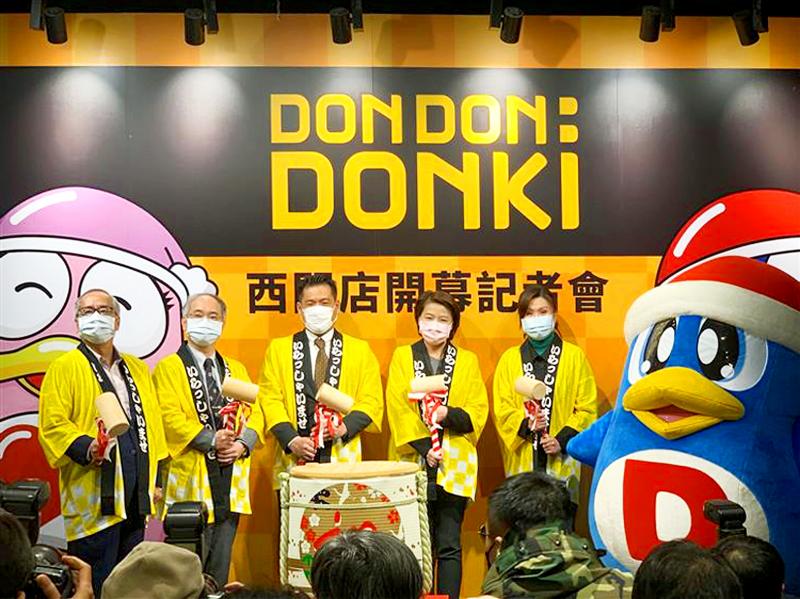Don Quijote, the biggest discount store in Japan, is opening its first store in Taiwan today.
The three-story Don Don Donki store in Taipei’s Ximending (西門町) area, which operates 24 hours a day, has already created 400 jobs, the Ministry of Economic Affairs (MOEA) said in a press release.
Many Taiwanese, including Taipei Deputy Mayor Vivian Huang (黃珊珊), consider a trip to Don Quijote an essential stop in Japan.

Photo courtesy of Department of Investment Services, Ministry of Economic Affairs
“I have been to Don Quijote at least 10 times myself,” Huang said yesterday at a news conference announcing the store’s opening. “They are rendering an important service, because we cannot travel outside of Taiwan at the moment.”
“There are a lot of Don Quijote fans in Taipei and by going to the store they can get a ‘mock travel’ experience,” she said.
Huang credited the Invest in Taipei Office (ITO) for assisting Don Quijote in opening its doors in Taiwan amid the COVID-19 pandemic.
“The ITO and the MOEA were with the company every step of the way, from forming the Taiwanese company to selecting the location,” Huang said. “As a result, we have [today’s] opening and jobs for many Taiwanese workers.”
A media tour through the store yesterday showed that more than 2,000 Japanese snacks will be available, along with fruit and seafood imported from Japan.
Other products for sale include cosmetics and skincare products, groceries, discount items and even adult entertainment products.
The COVID-19 pandemic is the reason Don Quijote decided to open a branch in Taiwan, said Mitsuyoshi Takeuchi, head of the Hong Kong, Taiwan and Macau business for Pan Pacific International Holdings Corp, the parent company of the Don Quijote chain.
“In the past Taiwanese travelers would go to Don Quijote in Japan to pick up authentic products; now they can get the products they were used to picking up in Japan in Taiwan any time,” Takeuchi said.
The Taiwanese outlet is to focus on products, such as Japanese snacks, that are not commonly available in Taiwan.
Takeuchi said there is fierce retail competition in Taiwan.
“To compete with Pxmart [全聯實業] and Carrefour, we have to keep innovating with new stores and new services, such as delivery or e-commerce,” he said.

MAKING WAVES: China’s maritime militia could become a nontraditional threat in war, clogging up shipping lanes to prevent US or Japanese intervention, a report said About 1,900 Chinese ships flying flags of convenience and fishing vessels that participated in China’s military exercises around Taiwan last month and in January have been listed for monitoring, Coast Guard Administration (CGA) Deputy Director-General Hsieh Ching-chin (謝慶欽) said yesterday. Following amendments to the Commercial Port Act (商港法) and the Law of Ships (船舶法) last month, the CGA can designate possible berthing areas or deny ports of call for vessels suspected of loitering around areas where undersea cables can be accessed, Oceans Affairs Council Minister Kuan Bi-ling (管碧玲) said. The list of suspected ships, originally 300, had risen to about 1,900 as

Japan’s strategic alliance with the US would collapse if Tokyo were to turn away from a conflict in Taiwan, Japanese Prime Minister Sanae Takaichi said yesterday, but distanced herself from previous comments that suggested a possible military response in such an event. Takaichi expressed her latest views on a nationally broadcast TV program late on Monday, where an opposition party leader criticized her for igniting tensions with China with the earlier remarks. Ties between Japan and China have sunk to the worst level in years after Takaichi said in November that a hypothetical Chinese attack on Taiwan could bring about a Japanese

Right-wing political scientist Laura Fernandez on Sunday won Costa Rica’s presidential election by a landslide, after promising to crack down on rising violence linked to the cocaine trade. Fernandez’s nearest rival, economist Alvaro Ramos, conceded defeat as results showed the ruling party far exceeding the threshold of 40 percent needed to avoid a runoff. With 94 percent of polling stations counted, the political heir of outgoing Costa Rican President Rodrigo Chaves had captured 48.3 percent of the vote compared with Ramos’ 33.4 percent, the Supreme Electoral Tribunal said. As soon as the first results were announced, members of Fernandez’s Sovereign People’s Party

MORE RESPONSIBILITY: Draftees would be expected to fight alongside professional soldiers, likely requiring the transformation of some training brigades into combat units The armed forces are to start incorporating new conscripts into combined arms brigades this year to enhance combat readiness, the Executive Yuan’s latest policy report said. The new policy would affect Taiwanese men entering the military for their compulsory service, which was extended to one year under reforms by then-president Tsai Ing-wen (蔡英文) in 2022. The conscripts would be trained to operate machine guns, uncrewed aerial vehicles, anti-tank guided missile launchers and Stinger air defense systems, the report said, adding that the basic training would be lengthened to eight weeks. After basic training, conscripts would be sorted into infantry battalions that would take